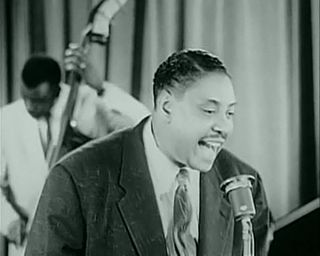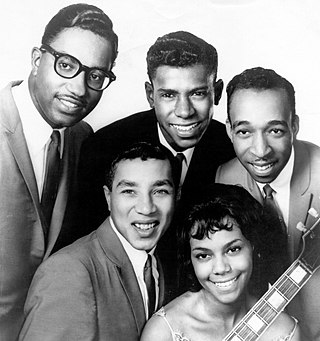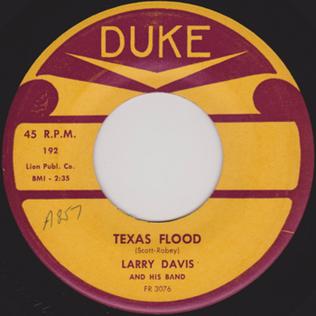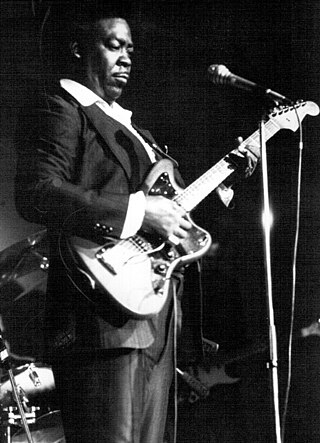Rock and roll is a genre of popular music that evolved in the United States during the late 1940s and early 1950s. It originated from African American music such as jazz, rhythm and blues, boogie-woogie, electric blues, gospel, and jump blues, as well as country music. While rock and roll's formative elements can be heard in blues records from the 1920s and in country records of the 1930s, the genre did not acquire its name until 1954.

Robert Leroy Johnson was an American blues musician and songwriter. His landmark recordings in 1936 and 1937 display a combination of singing, guitar skills, and songwriting talent that has influenced later generations of musicians. Although his recording career spanned only seven months, he is recognized as a master of the blues, particularly the Delta blues style, and as one of the most influential musicians of the 20th century. The Rock and Roll Hall of Fame describes him as perhaps "the first ever rock star".

Rhythm and blues, frequently abbreviated as R&B or R'n'B, is a genre of popular music that originated within African-American communities in the 1940s. The term was originally used by record companies to describe recordings marketed predominantly to African Americans, at a time when "rocking, jazz based music ... [with a] heavy, insistent beat" was becoming more popular. In the commercial rhythm and blues music typical of the 1950s through the 1970s, the bands usually consisted of a piano, one or two guitars, bass, drums, one or more saxophones, and sometimes background vocalists. R&B lyrical themes often encapsulate the African-American history and experience of pain and the quest for freedom and joy, as well as triumphs and failures in terms of societal racism, oppression, relationships, economics, and aspirations.

The Original Dixieland Jass Band (ODJB) was a Dixieland jazz band that made the first jazz recordings in early 1917. Their "Livery Stable Blues" became the first jazz record ever issued. The group composed and recorded many jazz standards, the most famous being "Tiger Rag". In late 1917, the spelling of the band's name was changed to Original Dixieland Jazz Band.

Ray Charles Robinson was an American singer, songwriter, musician and composer. He is regarded as one of the most iconic and influential musicians in history, and was often referred to by contemporaries as "The Genius". Among friends and fellow musicians he preferred being called "Brother Ray". Charles was blinded during childhood, possibly due to glaucoma.

The Moody Blues were an English rock band formed in Birmingham in May 1964. The band initially consisted of Graeme Edge (drums), Denny Laine (guitar/vocals), Mike Pinder (keyboards/vocals), Ray Thomas (multi-instrumentalist/vocals), and Clint Warwick (bass/vocals). Originally part of the British beat and R&B scene of the early–mid 1960s, the band came to prominence with the UK No. 1 and US Top 10 single "Go Now" in late 1964/early 1965. Laine and Warwick both left the band in 1966, with Edge, Pinder and Thomas recruiting new members Justin Hayward (guitar/vocals) and John Lodge (bass/vocals). They embraced the psychedelic rock movement of the late 1960s, with their second album, 1967's Days of Future Passed, being a fusion of rock with classical music that established the band as pioneers in the development of art rock and progressive rock. It has been described as a "landmark" and "one of the first successful concept albums".

Robert Calvin Bland, known professionally as Bobby "Blue" Bland, was an American blues singer.

The Miracles were an American vocal group that was the first successful recording act for Berry Gordy's Motown Records, and one of the most important and most influential groups in the history of pop, soul, R&B and rock and roll music. The group's international fame in the 1960s, alongside other Motown acts, led to a greater acceptance of Rhythm & Blues and pop music in the U.S., with the group being considered influential and important in the development of modern popular music.
The origins of rock and roll are complex. Rock and roll emerged as a defined musical style in the United States in the early to mid-1950s. It derived most directly from the rhythm and blues music of the 1940s, which itself developed from earlier blues, the beat-heavy jump blues, boogie woogie, up-tempo jazz, and swing music. It was also influenced by gospel, country and western, and traditional folk music. Rock and roll in turn provided the main basis for the music that, since the mid-1960s, has been generally known simply as rock music.

Warren Thomas "Pete" Moore was an American singer-songwriter and record producer, notable as the bass singer for Motown group the Miracles from 1955 onwards, and was one of the group's original members. He is also a 2012 Rock and Roll Hall of Fame Inductee, and a BMI and ASCAP award-winning songwriter, and was the vocal arranger on all of the group's hits.

Don Deadric Robey was an American record label executive, songwriter, and record producer. As the founder of Peacock Records and the eventual owner of Duke Records, he was responsible for developing the careers of many rhythm and blues artists in the 1950s and 1960s. He was the first African American record mogul, 10 years prior to Berry Gordy's Motown label.

"Texas Flood" is a blues song recorded by Larry Davis in 1958. Considered a blues standard, it has been recorded by several artists, including Stevie Ray Vaughan, who made it part of his repertoire.

"Sweet Home Chicago" is a blues standard first recorded by Robert Johnson in 1936. Although he is often credited as the songwriter, several songs have been identified as precedents. The song has become a popular anthem for the city of Chicago despite ambiguity in Johnson's original lyrics. Numerous artists have interpreted the song in a variety of styles.

Fenton Lee Robinson was an American blues singer and exponent of the Chicago blues guitar. In 2023, he was inducted in the Blues Hall of Fame.
James Louis Blythe was an American jazz and boogie-woogie pianist and composer. Blythe is known to have recorded as many as 300 piano rolls, and his song "Chicago Stomp" is considered one of the earliest examples of boogie-woogie music to be recorded.

"The Sky Is Crying" is a blues standard written and initially recorded by Elmore James in 1959. Called "one of his most durable compositions", "The Sky Is Crying" became a R&B record chart hit and has been interpreted and recorded by numerous artists.

Somebody Loan Me a Dime is a 1974 studio album by blues singer and guitarist Fenton Robinson, his debut under the Alligator Records imprint. Blending together some elements of jazz with Chicago blues and Texas blues, the album was largely critically well received and is regarded as important within his discography. Among the album's tracks is a re-recording of his 1967 signature song, "Somebody Loan Me a Dime". It has been reissued multiple times in the United States and Japan, including with bonus tracks.

Larry Davis was an American electric Texas blues and soul blues musician. He is best known for co-writing the song "Texas Flood", later recorded to greater commercial success by Stevie Ray Vaughan.
Aron Burton was an American electric and Chicago blues singer, bass guitarist and songwriter. In his long career as a sideman with Freddie King, Albert Collins and Junior Wells and released a number of solo albums, including Good Blues to You. His recorded work was nominated four times for a Blues Music Award in the category Blues Instrumentalist—Bass.

Nightflight is an album by the American musician Fenton Robinson, released in 1984. It was first released in the Netherlands, under the title Blues In Progress. Robinson supported the album with a North American tour.














